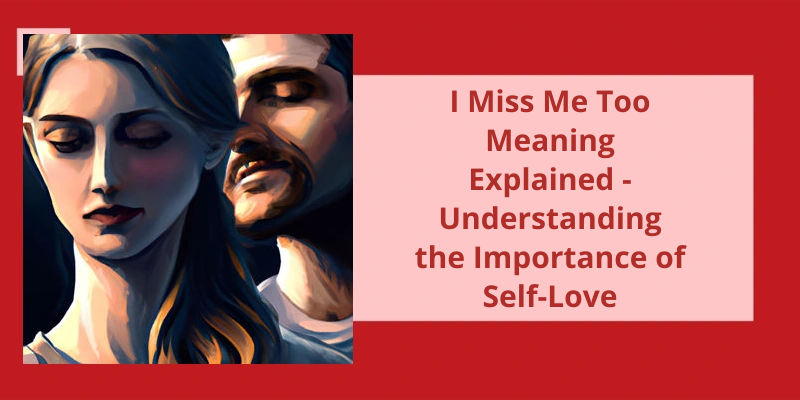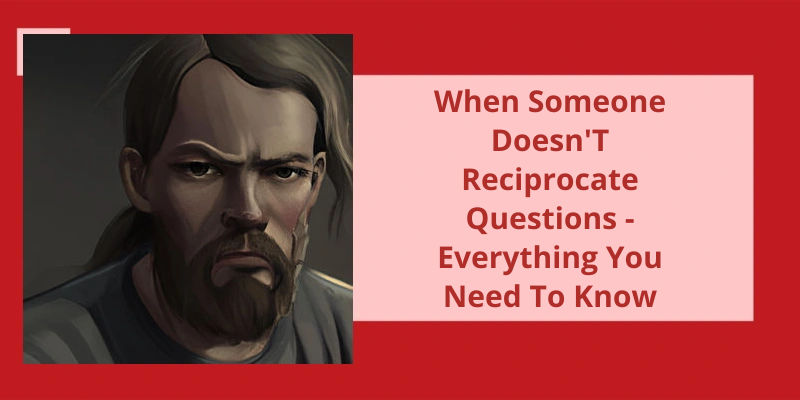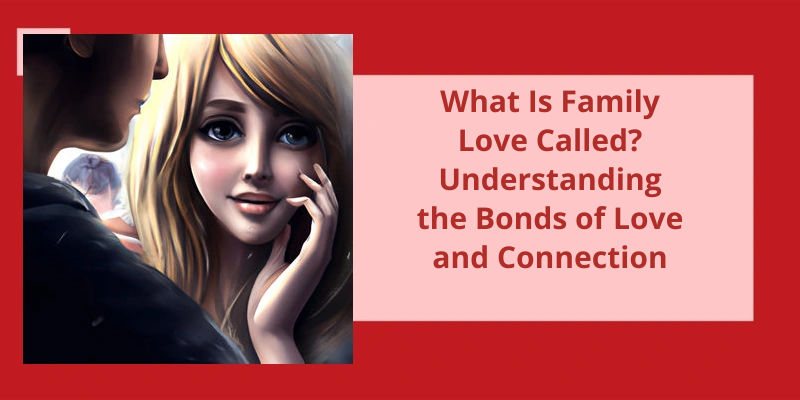Communication is a complex and nuanced process, where every word and phrase can carry multiple meanings and interpretations depending on the situation and context. The phrase "I miss me too" is a perfect example of how a simple two-word response can be easily misunderstood if not carefully analyzed. Despite sounding straightforward, this response may not always mean what we think it does, and it's important to understand the nuances and implications behind it. In this article, we'll explore the true meaning of "I miss me too" and shed some light on why it's important to be aware of the subtle intricacies of communication.
Is It Inappropriate to Say I Miss You?
However, there are a few situations where saying I miss you might be inappropriate or uncomfortable. For instance, if you’re saying this to a person who you’ve recently broken up with, it might come off as clingy or desperate. Sometimes, expressing too much emotion to a person who isn’t ready to receive it can lead to misunderstandings or awkward situations.
Another situation where expressing the sentiment of I miss you can be improper is in a professional setting. In the workplace, it’s generally advised to maintain a certain level of professionalism and not get overly personal with colleagues. If you miss someone from work, it might be better to find non-invasive ways of staying connected rather than saying something that could make them feel uncomfortable.
It’s also important to consider the cultural context of the person you’re expressing this sentiment to. In some cultures, expressing emotions openly isn’t common practice and could lead to misunderstanding or discomfort. It’s always a good idea to be mindful of the culture and customs of the person you’re interacting with.
It’s always important to consider the context and always keep in mind the emotions and feelings of the person you’re interacting with. By being mindful and respectful, you can create a positive and healthy relationship with the people you care about.
Different Ways to Express Missing Someone Without Saying “I Miss You”
There are a variety of ways to convey feelings of missing someone without explicitly saying “I miss you”. These can include sharing memories or pictures of times spent together, expressing how much that person means to you, sending thoughtful gifts or care packages, or simply checking in with them regularly to let them know you’re thinking of them.
Now that we’ve established the grammatical correctness of saying “I miss you, too” or “I missed you, too,” it’s important to understand the emotional significance behind these words. Whether it’s a long-distance relationship or a temporary separation, expressing your feelings can be difficult, and choosing the right words can make all the difference. So, let’s explore the deeper meaning behind these seemingly simple phrases.
Is It Correct to Say I Miss You Too?
The phrase “I miss you too” is a common way for people to express their feelings towards someone else. It’s a way of acknowledging the fact that someone else misses you and that you feel the same way about them. This phrase is usually used when a person is talking to someone who they aren’t currently with, and it’s a way for them to let the other person know that they’re also thinking of them.
This is a way of showing empathy and understanding towards someone elses feelings. The phrase is often used in situations where two people are separated by distance, such as when a person is away at college or on a business trip.
It’s important to note that the word “too” in this context means “also.”. It’s used to show that the person speaking is feeling the same thing as the person they’re talking to.
Some people may ask whether they should say “I miss you too” or “I missed you too.”. The choice of tense depends on the context. If two people have been reunited after being apart for some time, then “I missed you too” would be the more appropriate phrase to use.
This is because the word “too” is an adverb that modifies the verb “miss.”. Without the comma, the sentence wouldn’t make sense grammatically. It’s a subtle but important distinction that helps to convey the intended meaning of the phrase.
Whether you use “I miss you too” or “I missed you too” depends on the context, but both require a comma before “too” to be correct. Overall, it’s a simple but powerful phrase that helps to connect people who’re separated by distance.
Common Variations of “I Miss You Too”
This topic discusses different ways to express the sentiment of missing someone in response to hearing that someone misses you as well. The variations are intended to convey the same meaning but in unique and personal ways.
Moving from expressions of love to missing someone may seem like a natural progression, but the difference between the two is vast. While love signifies a connection and a desire to be together, longing for someone who isn’t there marks a sense of loss. In this sense, saying “I miss you” carries a weight that “I love you” does not; it implies that something has been lost or changed. Let’s explore this idea further.
Does I Miss You Mean I Love You?
When you say “I miss you” to someone, youre acknowledging the perceived distance between you and that person. Youre also expressing that their absence in your life is felt, and that you yearn to fill that void. While it’s often interpreted as a sign of love, it doesn’t necessarily mean that you love that person. It could just be a sentiment of fondness and appreciation for the time that you shared together.
It could be a way of showing support and empathy to a friend who’s going through a tough time, or it could be a sign that your ex is regretting their decision to end things.
Ultimately, the best way to determine the meaning behind “I miss you” is through open communication and honest dialogue. Ask the person what they mean when they say it, and share your own feelings and intentions as well.
Expressing how much you miss someone can be tough, especially when you want to do so in a unique and adorable way. Luckily, there are plenty of romantic synonyms for “I miss you” that will convey your feelings in a cute and special way. Keep reading to learn some heartwarming ways to tell someone you miss them.
How Do You Say I Miss You in a Cute Way?
Long distance relationships can be tough, but expressing your feelings can make all the difference. When you miss someone, it’s important to let them know how much you care. There are many ways to say “I miss you” in a cute, romantic way. It’s all about finding the right words that capture the essence of your feelings.
One way to express your longing is to say that your heart longs for your beloved. This phrase is poetic and portrays the depth of your emotions. You can say, “I long to be with you,” which communicates your intense longing to physically be in their presence.
When you cant stop thinking about someone, it’s a sign that you not only miss them, but you also crave their affection. You can use this sentiment to your advantage by saying, “I cant stop thinking about you.”. This shows your lover that they’re constantly on your mind, and that youre emotionally invested in the relationship.
Another way to express your feelings is to focus on the positive impact the person has on you. You can say, “I miss the way you make me feel,” which shows that your beloved brings joy and happiness into your life. This phrase emphasizes the importance of their presence and lets them know that they make a difference in your life.
If you feel like a part of you is missing when your lover isnt around, you can use this phrase to express your emotions: “I feel like a part of me is missing when you arent around.”. This is a powerful way to communicate your feelings and emphasize the significance of the relationship.
Finally, when all else fails, you can simply express your eagerness to be together again. You can say, “Your absence leaves a hole in my heart. I cant wait for the day when were together again.”. This phrase emphasizes the importance of your lovers presence and shows that youre eagerly awaiting their return.
Source: 15 Other Ways To Say I Miss You: Romantic & Friendly Phrases
Expressing the feeling of missing someone can be quite emotional, but hearing them reciprocate the sentiment can be truly heartwarming. It lets you know that they’re thinking of you too, and eagerly awaiting your reunion. So, what exactly does it mean when someone says “I miss you too”? Let’s explore some examples and shed light on this common phrase.
What Is an Example of I Miss You Too?
I miss you every moment weren’t together.”. “Every time I hear that song we used to listen to, I think of you and how much I miss you.”. “Nothing feels quite right without you by my side.”
“I miss you too” is a phrase that conveys a wide range of emotions. It’s a statement that shows a deep sense of affection and attachment, a feeling that can unite people across time and distance.
When two people are in love, the longing for each other’s company is often strong. Both partners will often feel the same way when they’re apart and will express this sentiment through the saying. It’s a way of connecting, even when they’re far apart.
“I miss you too” is also a way to bridge the gap between people experiencing different time zones or living far away from each other. Technology, such as video calls or texting, has made it easier to stay in touch and express those feelings, but nothing beats the physical presence of someone you care about.
The Potential Downside of “I Miss You Too” Becoming a Routine or Automated Response in a Relationship
When “I miss you too” becomes a routine or automated response in a relationship, it can lose it’s meaning and sincerity. This may prevent both individuals from expressing their true emotions and lead to a lack of genuine connection.
Conclusion
It’s important to be mindful of the nuances of language, especially in situations where miscommunication could lead to misunderstandings or hurt feelings. By taking the time to understand and accurately convey our thoughts and feelings, we can build stronger connections and relationships with those around us.






